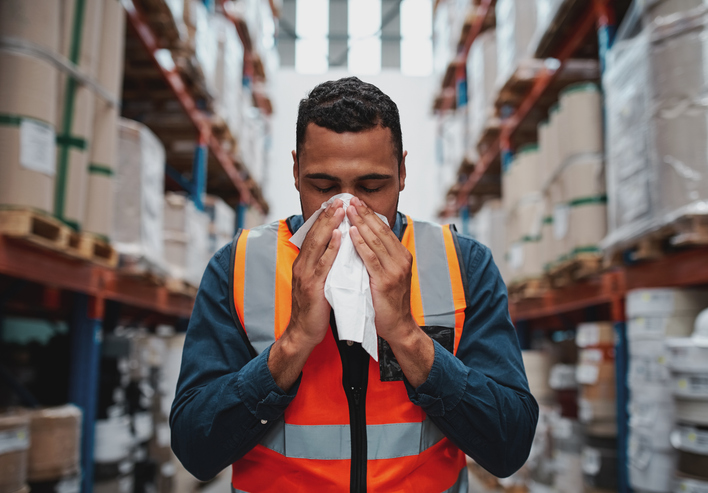Allergies can be challenging to deal with, even when an individual feels highly in control of their environment and lifestyle. However, these problems can become even more challenging when an individual is faced with allergy triggers in the workplace, as they will be forced to become exposed to these triggers on a daily basis. Though it can seem complicated, managing allergies in the workplace is possible, especially because of the wide scope of available allergy treatments. Learning about these steps can give a patient a leg up in terms of increasing their quality of life when they are exposed to allergic triggers.
How Allergies Impact Your Ability to Work
Allergies can take both chronic and acute tolls on an individual’s ability to function and be productive in their daily life. In addition, constantly being exposed to allergic reactions can take devastating tolls on an individual’s health over time. Allergic reactions can trigger inflammation in the body that can contribute to feelings of pain and fatigue if it continues unabated for long periods. In general, this process functions like this:
- An allergenic trigger triggers the inflammatory process in the body.
- This inflammation produces a class of substances known as cytokines.
- Cytokines reach the brain via the bloodstream, which is then tricked into believing that it is sick.
Through this process, the entire gamut of allergic reactions is born. Depending on the severity of an individual’s allergies, these allergic reactions can range from being merely annoying to being life-threatening emergencies. In the former case, utilizing over-the-counter antihistamines should be sufficient to help to control one’s allergies.
To avoid allergenic emergencies at work, you should inform your superiors that you have an allergy and keep emergency-level anti-allergy tools on hand. For example, if you are allergic to bee stings, carrying an epi-pen allows you to respond immediately in the case of a sting. Having allergy medication readily available has the potential to be life-saving if a severe allergic reaction occurs.
Identify the Source of Your Problem
One of the best ways that you can take control of allergies in your workplace is by taking steps to identify the source of your allergy attack. In general, that means following these steps:
- Identifying your allergy triggers
- Understanding whether or not those are present in your workplace
- Finding the best allergy medicine for your particular situation
Following these simple steps can make a huge amount of progress in terms of controlling your everyday allergic responses.
Common Allergenic Triggers in the Workplace
Many of the common allergenic triggers in one’s workplace are very similar to the ones that exist in the home. Potential allergy triggers that an individual can encounter in the workplace include:
- Cigarette smoke
- Cockroaches
- Chemical fumes
- Aerosols
- Cold air
- Dust
- Fresh paint
- Mold
- Mildew
- Paint
- Perfume
- Pet dander
- Mites
- Pollens
- Molds
- Wood dusts
- Chemicals
- Fumes
- Salts
The exact nature of your work will determine which of these you encounter. For example, a construction worker will be exposed to different types of allergenic triggers than an office worker.
Managing Allergies in the Workplace
There are steps that you can take to curb the impact of your allergenic triggers in the workplace. Specifically, you will lessen your reactions if you control your environment as much as possible. The following steps can be useful to those with allergies:
- Ensure that your work area is well-ventilated and has the correct amount of humidity set to control the presence of molds and pests.
- Take steps to ensure that your work area is dusted regularly.
- If you are responsible for cleaning your own work area, wear a protective mask while doing so.
Unfortunately, some professions—such as floristry—do not allow individuals to have the same level of control over their environment. These individuals will be left to find the right medications to control their allergies.
The Best Allergist in New York City
Dr. Mayank Shukla is perhaps the most highly respected allergy doctor in New York when it comes to treating an individual’s unique allergy needs. If you worry about how you might interact with allergenic triggers in your workplace, schedule a consultation with our office to discuss some of the treatment options available to you.

